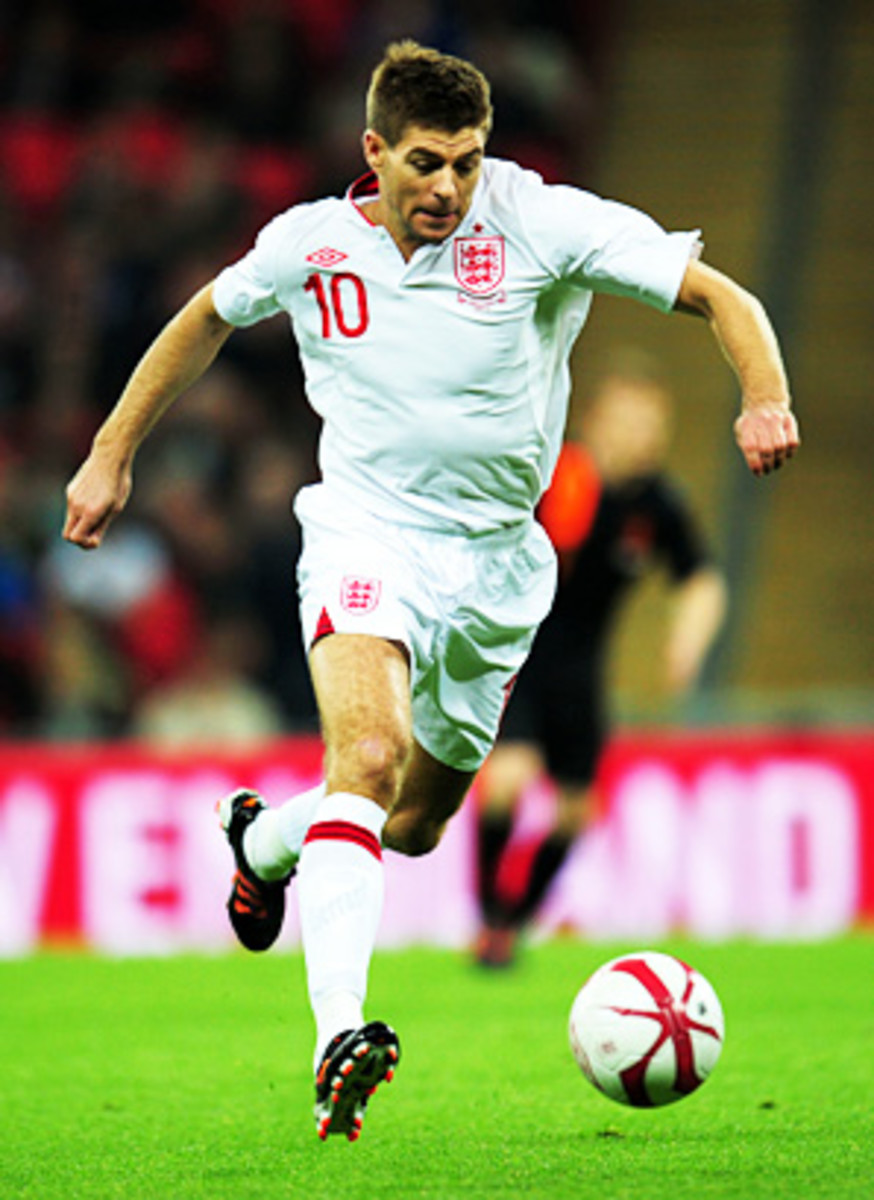Euro 2012 Preview: England
Hodgson, too, talked about England's first match against France as if he was in charge of footballing minnows. "Whether we can beat them, I don't know," the 64 year old said. "I don't think we'll go into the game as favorites to be frank -- not in terms of what France have done in the last couple of years vis-a-vis what we have done."
Hodgson could be adopting a more humble mindset after the misplaced hubris of yesteryear, preparing the English public for his unabashedly defensive tactics or simply managing expectations. Probably all three apply. Following the World Cup 2010 debacle and some late withdrawals by injured players (Frank Lampard, Gary Cahill, Gareth Barry), England is approaching Euro 2012 with a sense of realism that borders on the fatalistic. Reaching at least the quarterfinals shouldn't be beyond this team, but there's a distinct danger that Hodgson's "we can't really win" shtick could turn into a self-fulfilling prophecy.
M Steven Gerrard
The 32-year-old has been plagued by injury problems throughout the season, but now has a chance to make his national mark. England's captain will play in his favorite position, so there shouldn't be any excuses. A deep-lying England will heavily rely on Gerrard's dynamism and goal-scoring prowess on the break.
M Scott Parker
Parker, 31, has a key role in shielding both Gerrard and the back four. England's inability to "rest on the ball" will put huge pressure on him to cover plenty of ground. His relative inexperience at this level -- he's never started a tournament match before -- and a sore Achilles tendon won't make his task any easier.
M Ashley Young
The Manchester United midfielder will fill in for the suspended Wayne Rooney in a free role behind sole striker Andy Carroll. Young's pace will be a huge threat for opposition teams; he's tailor-made for Hodgson's system.
Will the Rio/"JT" melodrama have a lasting impact?
England's tournament preparations were overshadowed by the controversy that surrounded Rio Ferdinand's exclusion from the squad. Hodgson has stuck to his line that "football reasons" were behind the decision, but not everyone is convinced. "Hodgson is trying to pull the wool over our eyes, but we are not stupid," said former England player Paul Ince. Hodgson might have gotten away with picking John Terry, the Chelsea captain who is accused of racially abusing Rio's younger brother Anton Ferdinand (QPR), but his subsequent call-ups of defenders Phil Jagielka and Martin Kelly have caused a stir. The manager must have felt that putting Ferdinand and Terry on the same squad was impossible. The debate could conceivably calm down once matches begin, but any defensive mistake will immediately reignite it.
Will Wayne Rooney's return save England?
The script already seems written: England will lose against France, beat Sweden and then welcome back Rooney in time to secure quarterfinal qualification. Rooney can then fill his role as England's savior. Unfortunately, there are two problems with this narrative. First, Rooney -- far from being a footballing messiah -- has continually disappointed in big tournaments since bursting onto the scene in 2004. Second, depending on its first two results, England could already be out of contention by the time that the 26-year-old returns.
Will fatigue play a role?
Heat, traditionally one of England's fiercest opponents at international tournaments, won't play a major role this time if the weather prediction for Ukraine is to be trusted. But following the injuries in the run-up to the event, post Premier League fatigue could play a significant factor. An inglorious exit would only strengthen calls for a winter-break, though nothing is likely to change.
Hodgson is sticking with a 4-4-1-1 formation that was widely described as staid and old-fashioned after Fabio Capello's men crashed out in South Africa. But that's not to say that the 64-year-old can't make it work. Hodgson will drill exact positioning and guarantee that England will be, at the very least, hard to break down. If they can break quickly with long balls towards Andy Carroll, take advantage of dead-ball situations or find Young with some incise through-balls, England may yet find a winning formula.
The key is to avoid panicking and losing its shape if, and when, better sides monopolize the ball. The results won't be pretty, but they should be effective. Chelsea won the Champions League with such a strategy, as did Greece during the European Championship in 2004. The biggest problem with this approach, apart from aesthetics, is an over-reliance on soaking up pressure. Considering the injuries, it might be a gamble to play for a clean sheet -- especially in the sense that this kind of "1-0" strategy only works as long as England doesn't concede the first goal.





